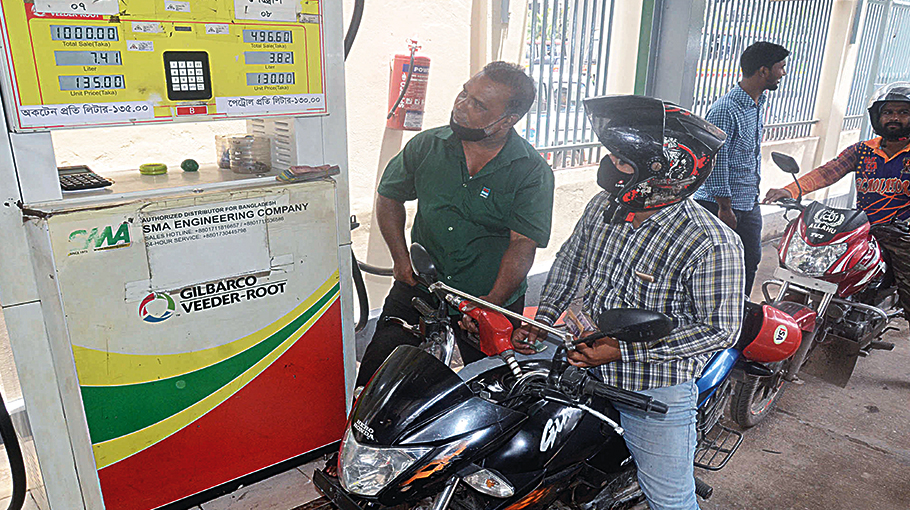Fuel prices hiked unusually


Bangladesh government has hiked fuel prices to level not seen since the country's independence in 1971. However, the fuel price is falling in the international market.
Experts say rise in fuel prices will cause inflation further, increase transport fare, prices of daily essentials, and the production cost of goods. This means the lower income group would have to further tighten their belts.
State Minister for Power, Energy and Mineral Resources Nasrul Hamid told reporters the decision was driven by global markets.
"Some adjustments have to be made in view of the global situation. If the situation normalises, the fuel prices will be revised accordingly," he said.
However, Benchmark Brent crude futures fell below $93 per barrel on Friday, down from a peak of $133.18 in March.
Sources said that the government is trying to take a loan of about $ 450 million from the International Monetary Fund (IMF) to deal with the economic crisis. However, the main condition of the loan from this organisation is to remove subsidy from the energy sector.
Analysts now believe that the government met their conditions by raising oil prices before the official meeting on the loan they sought from the agency.
"It was necessary but I never imagined such a drastic hike. I don't know whether the government is fulfilling the prerequisite condition to have an IMF loan," a government official said.
A large part of the Tk 82,745 crore of subsidies allocated in the budget of Bangladesh for the current financial year is for fuel oil, gas and electricity. Last month, an IMF delegation came to Dhaka and advised the government to reduce the subsidy.
Researcher and Economist Dr Khandaker Gholam Moazzem said,
“The government is going to take loans from donor agencies and that is why the government may decide to increase oil prices so much as part of subsidy management.”
Due to the unprecedented drop in oil prices in the global market, the Bangladesh Petroleum Corporation (BPC) made a profit of around Tk 47,000 crore by selling fuel oil in seven years from 2014-15 financial year to 2020-21.
However, profits have been steadily declining since the start of the Ukraine war. But after seven years of profits, why BPC could not cope with the rise in prices in the global market is a big question.
Many critics of the government say that corruption and unnecessary spending on mega-projects have led to the government's unbridled increase in fuel prices as it faces a cash crunch.
Terming the government's move as 'rubbing salt in the wounds', main opposition Bangladesh Nationalist Party (BNP) Secretary General Mirza Fakhrul Islam Alamgir said the hike would have a terrible impact on the economy.
"The price hike is undoubtedly the highest since independence. This will put extreme pressure on the economy… Countless people will be pushed into poverty," said energy expert Dr M Tamim.
"The fuel price in the global market is declining and the prediction is that it will continue [till the end of the year]. Had the government continued to provide subsidies as usual, the price would not have exceeded Tk 100," he added.
"I do not know whether the government has hiked the price to reduce the subsidy… May be the IMF loan [that Bangladesh has sought] has a big role here, because the first and foremost condition to get an IMF loan is not to give any subsidy on fuel.
Diesel power plants accounting for 1,500 megawatts of generation capacity -- 10 percent of the total -- have been taken offline, as have some gas-fired plants. In recent weeks, electricity blackouts of up to 13 hours a day have resulted.
The government on Friday night hiked fuel prices by up to 51.7 percent, adding to the plight of common people already struggling to cope with the rising costs of living.
As per the new prices, 1 litre of octane now costs Tk 135, which is 51.7 percent higher than the previous rate of Tk 89. The price of each litre of diesel and kerosene has reached Tk 114 from Tk 80.
Similarly, each litre of petrol now costs Tk 130, a rise of Tk 44 or 51.1 percent, said a press release from the Ministry of Power, Energy and Mineral Resources, stating that the prices have been raised as fuel prices in the international market are a lot higher than that in Bangladesh.
Last week, the government hiked prices of urea fertiliser by 37.5 percent to Tk 22 per kg, a blow to farmers, many of whom suffered losses from recurring floods and low crop yields this year.
Earlier The government last hiked diesel price in November 2021 from Tk 65 to Tk 80. Afterwards, bus prices rose nearly 27 percent, much higher than the corresponding jump in fuel prices. Similarly, launch prices went up by 35 percent.

